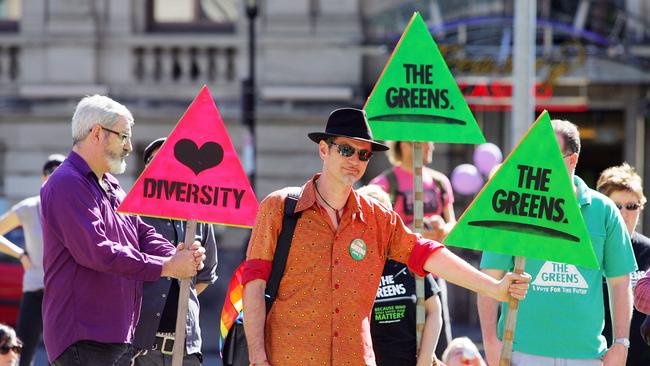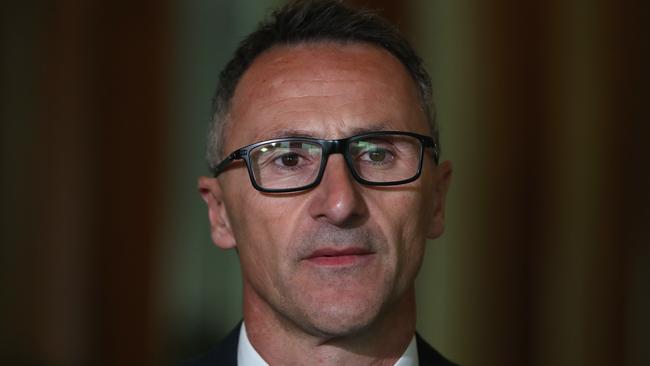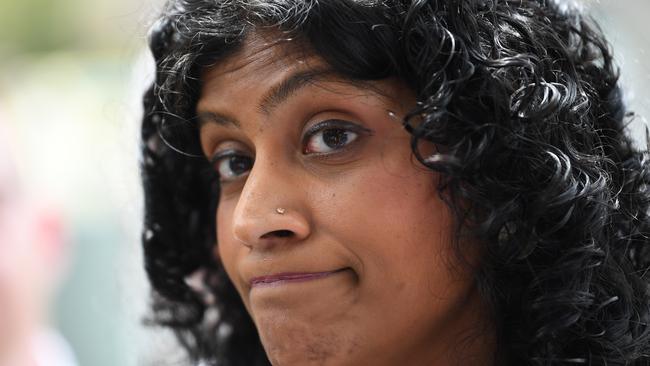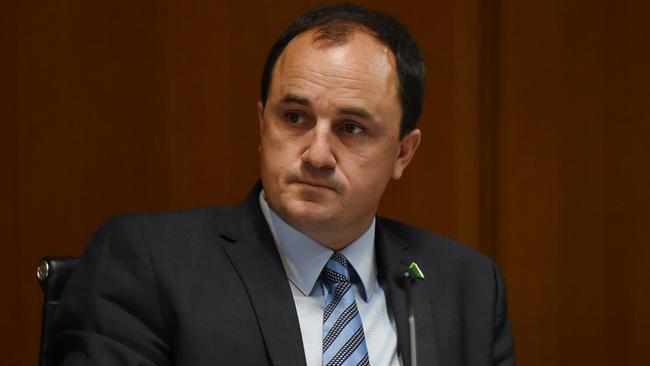The Greens’ #MeToo woes
The Liberals are not the only ones being torn apart by internal turmoil.

It is a warm spring day in Melbourne and you are a 20-something voter riding the No 19 tram through the heart of Brunswick, a suburb so woke it never sleeps. Like everyone else on the tram, you’ve got your eyes on your phone, scrolling through the like-minded thoughts of friends and citizen journalists, when you thumb across a promoted link for Greensinfo.com. Being politically engaged and naturally curious, you click on the link.
This is what you find. “No one is above accountability,” the banner headline reads. The website, no more than a single page, is a lurid rap sheet of Greens behaving badly.
A candidate who promotes date rape, drug use and domestic violence. A former state leader who refers to women as fat, hairy lesbians and power pussies. Comments from Lee Rhiannon likening the Greens to the Catholic Church for their failure to act on claims of sexual abuse and misconduct. There are videos. Stories. Pictures.
You are smart enough to realise it isn’t a genuine Greens site, even if you can’t read the microscopic ALP endorsement at the bottom of the page. Yet when you follow the links you notice that the source for most of the allegations are ABC reports and every claim has originated from deep within the Greens. This isn’t what political opponents think about the Greens; this is what Greens women are saying about their own party.
This week Labor has celebrated the impact of Greensinfo.com, the centrepiece of a devastating negative campaign that sucked votes from the Greens in the Victorian election and diminished the influence the party will have in the next state parliament. ALP insiders are promising more of the same when NSW and the nation go to the polls within the next six months. “This is the beginning of what we are continually going to do to expose them for what they really are,” an ALP source says. “Federal CHQ will take this on. We are going to double down. We will use nationally what we have done in Victoria.”
Are the Greens really a party of gropers and sexual harassers, of man-bunned misogynists who, after too many craft beers in Newtown or Fitzroy, prey on young, idealist staff and volunteers who believe its men are somehow immune to workplace lechery? If you examine each case and properly weigh the evidence, the proposition remains as far-fetched as it first sounds. This doesn’t mean the Greens don’t have a serious political problem, however.
The Greens have wholeheartedly embraced #MeToo, a movement yesterday described by the party’s federal leader, Richard Di Natale, as a “long overdue reckoning’’ for disrespect shown by men towards women. Within the Greens, a party whose membership is uber-aware of gender and sexual politics, something else is happening. The #MeToo movement has fused with factional rivalries and metastasised into a potent political weapon.
In the Victorian election, Labor grabbed this weapon and turned it against its owner. Where has this left the Greens in Victoria? A party with a reduced say over the political affairs of the state.

A week into counting, the electoral bottom line is not as bad as first perceived. The Greens targeted five inner-Melbourne seats and stand to win three; Melbourne, Brunswick and perhaps Prahran. This would be a gain of one seat from the 2014 election result. The substantial loss is Northcote, which the Greens picked up from Labor in a by-election last year and now have surrendered with barely a yelp. This is the first time Labor has prised a lower house seat back from the Greens. The campaign for the other target seat, Richmond, ended in an ALP walloping.
In the upper house, where the Greens previously held sway with five balance-of-power MPs, the portents are grim. It is likely that only Greens state leader Samantha Ratnam will keep her seat. From a Greens perspective, the villain of the piece is preference whisperer Glenn Druery, who for a substantial fee scooped up a disparate group of micro-party candidates and sculpted a cynical masterpiece.
Calls for reforms probably will fall on deaf ears.
On the latest count, the Greens secured a positive swing in four of their five lower house target seats but their 10.4 per cent share of the statewide vote is down about 1 per cent from the 2014 election. In votes and in seats, the Greens have gone backwards.
This was Ratnam’s first campaign as Greens leader. By any measure, it was a bruising affair for the carefully spoken former social worker. As she talks through the numbers with The Australian in her Carlton campaign office, she insists that, given the extraordinary swing to Labor and the unexpected collapse of the Liberal vote, support for the Greens was resilient. She argues that the threat of the Greens, particularly in seats such as Richmond, forced Labor to embrace a more progressive policy agenda in areas such as climate change and public housing. She also concedes that the loss of MPs will hurt: “It does impact on what we potentially might be able to do in the parliament.”
The dilemma for the Greens is not trying to figure out what went wrong; it is how to protect the party against a repeat occurrence in the NSW and federal elections. This dilemma is particularly acute in NSW, where sexual misconduct allegations have been weaponised in a destructive factional feud. The policy prescriptions may seem obvious — better vetting of candidates and improved mechanisms for dealing with candidates who become compromised by allegations of sexual harassment or assault — but within the highly democratic, decentralised political culture and organisation of the Greens, each is a double-edged sword.

“We have to ask ourselves a really serious question about what kind of people we want representing us in parliament,” Di Natale tells The Australian. “If we want real people who are actually representative of the community they serve, including more young people, then we have to accept that some may have made mistakes as teenagers and young adults, and those mistakes will now be recorded forever in their digital history.
“There’s no question that we have to do better at making sure that we have all the information ahead of time so we can be better prepared when Labor attacks our candidates, but we are not going to disqualify everyone just because they have made mistakes.”
More thorough vetting and preparation of candidates will blunt Labor attacks of the kind waged in the Victorian election. This included the exposure of a young Greens candidate who “liked” sexist comments on Facebook when he was 13 years old and another candidate who previously put his voice to misogynistic lyrics as a rap artist. The Greens should have been better prepared to deal with these issues. No one within the Greens could have been prepared for what took place 48 hours before voting day.
Two days before Victoria voted, Ratnam received an email from a woman who claimed she was raped by the party’s candidate for Sandringham. That candidate, Dominic Phillips, is a 21-year-old university student and environmentalist who was standing in his first election for the Greens and still lives with his parents. Within a few hours of the complaint being lodged, the woman’s allegations were published by the Herald Sun. It was a brutally timed, co-ordinated attack to inflict maximum political damage.
The next morning, Ratnam confirmed during an ABC radio interview the identity of Phillips, who had not been named in the Herald Sun story, and said his campaign had been suspended pending an investigation. The Australian understands there is no investigation. The Greens concede they don’t have the capacity to investigate a serious criminal allegation of this kind and have encouraged the woman to go to the police. They don’t know if she has. She hasn’t contacted the party since the election. Phillips, with his professional life ahead of him, is facing an uncorroborated and unproven rape allegation that may never be investigated, much less resolved. He has so far declined to comment.
Ratnam says she had no choice other than to suspend Phillips’s campaign and identify him to lift suspicion from other Greens candidates. Some of them were being called rapists at pre-polling centres. “It is extraordinary, it is challenging, it has implications for all political parties,” she says. “The welfare of Dominic matters to us. The welfare of the person who made the complaint matters as well. It really does.”
How can an untested allegation of serious sexual assault become the daily fodder of a state political campaign? For the Greens, the origins can be found early in the #MeToo movement, when factional rivals of NSW Greens MP Jeremy Buckingham helped facilitate the airing of a seven-year-old sexual harassment complaint against him by Ella Buckland, a former Greens research assistant.
The substance of the allegation was that Buckingham put his arms around Buckland and kissed her on the neck, uninvited, in the street outside his Newtown house after a night of heavy drinking. She further alleges that he subsequently harassed her at work. Buckingham denies both allegations, and a second woman who was present that night said Buckingham never left the house and followed Buckland into the street.

A formal, written complaint — received by Buckingham the day before a Greens preselection vote to decide his future in parliament — was investigated by an external workplace consultant, Workdynamic, which advised the party to resolve the issue with “no adverse finding against Mr Buckingham, with respect to sexual harassment or inappropriate behaviour”. Rather than resolve the matter, the NSW Greens are imploding. In state parliament this month, upper house MP Jenny Leong accused Mr Buckingham of an “act of sexual violence” while departing MP Dawn Walker spoke in support of Buckingham and accused his factional opponents of harassment, bullying and slander. Di Natale publicly has called for Buckingham to resign.
Buckland’s allegations against Buckingham were broadcast in August in an ABC 7.30 story that also detailed a rape allegation by another woman against an unnamed Greens staff member and an allegation by a third woman of aggressive sexual overtures by an unidentified Greens volunteer two years earlier. A link to the ABC 7.30 report was included on Greensinfo.com.
The broad charge against the Greens is that they have responded inadequately to allegations of sexual misconduct. Ratnam agrees the Greens need to do better. “This is something everyone is grappling with and our institutional responses, across the board, whether you are a political party or another organisation, have not been good enough,” she says. “You can’t fix this stuff by hiding it or sweeping it under the carpet.”
A senior Greens source says a bigger problem for the party is the culture of grievance and complaint that allows any allegation, no matter how vexatious, to assume a level of credibility.
“The truth is that the Greens are similar to any other organisations of similar composition and size on these issues,” the source says. “What’s different is hypersensitivity among progressives and the weaponisation of sexual harassment issues. Potentially innocent people are being thrown under the bus for political expediency and it is now a significant reputational risk to stand as a Greens candidate.”
This is something all Greens candidates will ponder before the NSW and federal elections. A political party that warmly embraced #MeToo is watching it devour the host.
